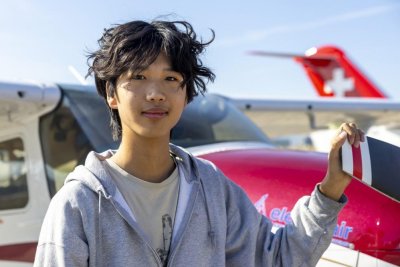
U.S. pilot Ethan Guo stands next to his Cessna before s takeoff from Geneve Aeroport in Geneva, Switzerland, in August 2024. He was barred from taking off from Chile’s Teniente Marsh Air Base in Antarctica because, authorities said, he landed there June 1 without permission, File Photo by Salvatore Di Nolfi/EPA
SANTIAGO, Chile, Aug. 25 (UPI) — After spending nearly two months unable to leave Antarctica with his aircraft, American pilot and influencer Ethan Guo, 19, is set to return to Punta Arenas aboard an icebreaker in early September.
Chilean authorities said Guo altered his flight plan and landed without authorization on the continent June 1, and they forced his small aircraft to remain at the Chilean air base in Antarctica at which he set down.
Officials said Guo was not barred from leaving, but he chose to stay at the base until the dispute was resolved. Prosecutors argued that the 19-year-old American influencer broke “multiple national and international regulations” by changing his flight plans without prior notice and landing in a sector of Antarctica claimed by Chile.
“Ethan Guo will board the icebreaker Almirante Viel in early September, which will allow him to return to Punta Arenas. I want to thank the Chilean Navy for helping resolve this humanitarian problem, because he had no way to leave Antarctica other than flying his own aircraft, which was not authorized,” his lawyer, Jaime Barrientos, told UPI.
Since 2024, Guo has led the campaign “Flight Against Cancer,” aiming to become the first pilot to fly solo across all seven continents in a Cessna 182Q, while raising $1 million for childhood cancer research after his cousin was diagnosed with the disease.
On June 28, Guo took off from Punta Arenas, bound for Ushuaia, Argentina, but changed course due to weather and landed instead at Teniente Marsh Air Base on King George Island, about 745 miles away.
Chilean officials said he filed a flight plan to depart from Punta Arenas, which he later failed to follow. By changing course without notice, an emergency protocol was triggered. The country’s Directorate General of Civil Aviation accused him of violating aviation rules and jeopardizing air safety.
Barrientos countered that Guo had received clearance to modify his plan.
“There is irrefutable evidence that he established communication with the DGAC, made the change and was expressly authorized to land at Teniente Marsh,” he said.
Speaking with Chilean newspaper Las Últimas Noticias, Guo said he never lied about his route.
“What happened on June 28 was deeply unfair. I didn’t understand the language they spoke to me in, and I was not allowed to present evidence to defend my case,” he said.
Living at the Chilean base, Guo described the experience as stressful and isolating.
“I spend 90% of my time in my room, and there isn’t much to do. Not everyone here speaks English, but they’ve treated me kindly. Despite the unfair legal process I’ve faced, I have a very good impression of Chile and its people.”
The case was closed through an out-of-court settlement. Regional prosecutor Cristián Crisosto said Guo agreed to donate $30,000 to charity and is barred from returning to Chile for three years.
As for the aircraft, Barrientos said the DGAC reached a deal allowing an authorized pilot to fly it back to Punta Arenas and then to the United States.
“We are complying with DGAC requirements so the plane can be returned as soon as possible,” he said.
Guo’s lawyer emphasized the young pilot’s experience: “He has landed in 50 countries, including war zones, crossed the Atlantic twice and flown more than 10 hours over the ocean. He was fully qualified to make the return flight, but we accepted the alternatives provided by the DGAC.”
For now, Guo said he only wants to move on.
“I haven’t seen my family or friends in months, so I hope to reunite with them soon. I just want to close this chapter of my life.”